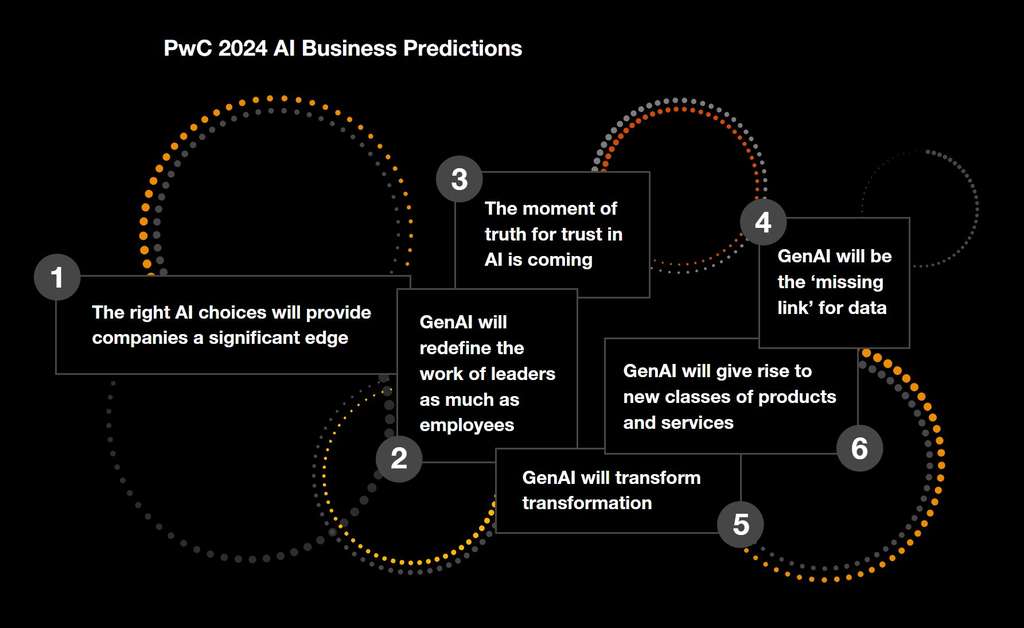Technological advances, surging investments and the competition for talent are all working toward one thing: In 2024, artificial intelligence (AI) will start to fundamentally change how business gets done. It will impact how companies grow revenue, conduct everyday operations, engage customers and employees, build new business models, and more.
Seventy-three percent of US companies have already adopted AI in at least some areas of their business, according to our 2023 Emerging Technology Survey — and generative AI (GenAI) is leading the way. One year after ChatGPT hit the market, more than half of the companies we surveyed (54%) have implemented GenAI in some areas of their business.
GenAI has made AI remarkably accessible and scalable. A single GenAI model can, with a little customization, work in many business functions and across lines of business. Whether you’re a CEO or a software developer, a tax leader or a product designer, by the end of 2024, AI will enable you to do your job in new, more powerful ways.
We’ve been making AI predictions for seven years now. Based on this experience and our longstanding leadership in AI, we feel confident in making six new predictions for 2024. Some are already becoming full-fledged trends. Others are in the offing. All can lead to concrete actions that can create business value for many years to come.

The right AI choices will provide companies a significant edge
In 2024, many companies will find attractive ROI from GenAI, but only a few will succeed in achieving transformative value from it. GenAI may appear easy to use, and many cloud service providers are already embedding GenAI capabilities in their offerings. But realizing GenAI’s full potential requires more than just letting employees use new capabilities in enterprise applications, however powerful they may be. It requires taking advantage of GenAI’s capacity to be customized to your specific needs and its remarkable scalability — while also paying close attention to its potential risks.
One key is to avoid the use-case trap. If you use GenAI only in isolated instances, you’ll get only limited value. Instead, prioritize “patterns” that can scale. For example, GenAI’s capacity to draw insights from unstructured data (such as text) can help nearly every knowledge worker grow capacity and make better decisions.
It’s important to provide workers with incentives to not just use the new technology but to use it to reimagine their jobs. Tech advances mean they can reinvent their work by finding ways to deploy and customize GenAI to automate some tasks and augment the rest. As the technology keeps improving and costs keep dropping, leadership will have some reimagining to do. Once GenAI cuts the cost of digital labor, will you be able to pivot to new operations and business models?
GenAI will redefine the work of leaders as much as employees
No one yet knows the long-term impact of AI on overall employment, and 2024 will still be too soon for definitive answers. But AI will start to change how almost everyone — especially those at the highest levels — does their jobs. Whether in the C-suite or on the shop floor, people who know how to use AI will outcompete those who don’t. There’s long been talk about the need for AI skills in the workforce, and it’s true: Employees need skills, guardrails and incentives to use AI responsibly.
But managers face even bigger challenges. Besides learning how to use AI responsibly, middle managers will need skills to oversee and assess teams in which AI agents do much of the work. Functional leads will have to understand how AI can not just augment processes but replace them. The C-suite will have to take the lead on AI-native operations and business models. Few leaders today have both organizational and AI knowledge — and closing this gap will be critical.
The moment of truth for trust in AI is coming
In 2024, AI will be an essential part of how your people interact with data, stakeholders and each other. Trust in AI will be critical — and that means more than just compliant, secure systems. It means deploying the right solutions for the right situation with the right data, policies and oversight to achieve relevant, reliable results. That requires responsible AI, an enterprise-wide approach and set of practices. Responsible AI can help everyone who develops and uses AI do so with an eye toward building trust.
This will be the moment of truth for responsible AI for two reasons. As GenAI takes on more work — writing financial reports, automating parts of software development, analyzing proprietary data for go-to-market strategies and so on — mistakes could have wide-reaching impacts, including stalling transformation initiatives. We also expect potential AI risks to attract public attention. Policymakers are already taking action, and we may see a GenAI-related crime, such as a political deepfake, hit the headlines. Many GenAI vendors now offer to indemnify customers for potential copyright infringements. That reduces one risk — but trust in the outcomes of your AI systems are still your responsibility.
GenAI will be the ‘missing link’ for data
GenAI can help you turn more data into more value more quickly — giving many data initiatives an attractive cost/benefit ratio that they may have lacked before. It can scan, read, summarize, translate, analyze and troubleshoot even highly unstructured data that’s trapped in presentations, strategy papers, customer logs and the countless other documents that define your organization. GenAI can, in other words, answer one of the greatest challenges for many companies: processing and creating intelligence around large sets of complex, unstructured data.
Even so, GenAI can’t do it all. It still requires you to digitize data, move it to the cloud, enable GenAI to access it, assure reliability and compliance, and manage risks. Executives increasingly understand just how important this data modernization work is. In our survey, 44% of business leaders said that their companies are planning to implement data modernization efforts in 2024 to take better advantage of GenAI.


